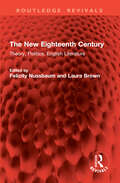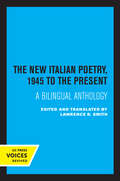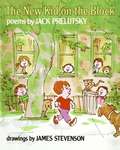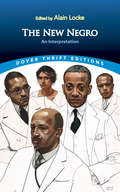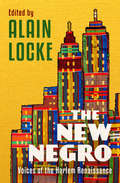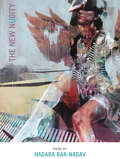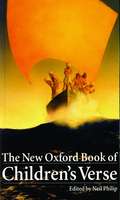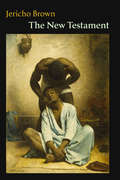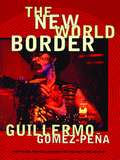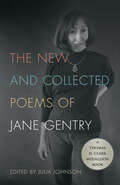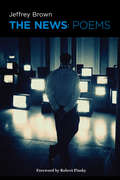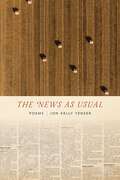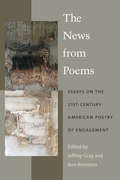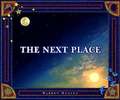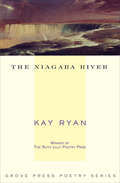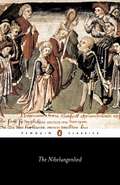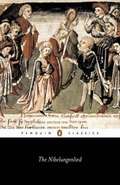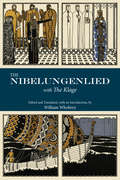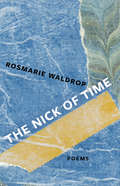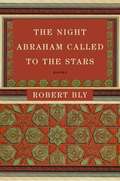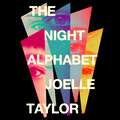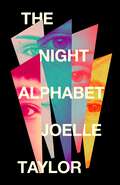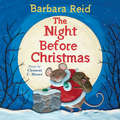- Table View
- List View
The New Eighteenth Century: Theory, Politics, English Literature (Routledge Revivals)
by Laura Brown Felicity NussbaumFirst published in 1987, The New Eighteenth Century (now with a new preface by Felicity Nussbaum and Laura Brown) examines eighteenth century English literature’s resistance to the application of new theoretical approaches and presents new work by leading scholars which both challenges this resistance and demonstrates the usefulness of feminist, Marxist, new-historicist, and psychoanalytic approaches to the analysis of eighteenth-century texts.This book reinterprets and resituates canonical works (by such writers as Fielding, Goldsmith, and Sterne) but also explores areas and figures increasingly important to eighteenth-century study. It opens questions about the canon and about the nature of "canonicity" itself as it considers texts by women, working-class literature, guidebooks for bourgeois tourists, and aspects of the cultural and social terrain including problems of race and colonialism, capitalism, and penal institutions.The New Eighteenth Century not only provides new ways of looking at the literature of the period but serves as a model for future work in eighteenth-century studies.
The New Italian Poetry, 1945 to the Present: A Bilingual Anthology
by Lawrence R. SmithPostwar Italian poetry carries on the legacy of one of the world's richest literary traditions, a tradition in which conflict and diversity are important parts. It is a poetry that reflects, with extraordinary intensity, the social, psychological, and moral turmoil of the modern world. Substantial selections fromt ehw orks of twenty-one of Italy's most influential contemporary poets make up this anthology, which will make this largely unknown poetic territory more familiar to the English-speaking world. The introductory essay discusses the unique Italian talent for fusing cultural and political struggle into literary form and Italian poetry's important impact on developments in European poetry throughout the twentieth century. This title is part of UC Press's Voices Revived program, which commemorates University of California Press's mission to seek out and cultivate the brightest minds and give them voice, reach, and impact. Drawing on a backlist dating to 1893, Voices Revived makes high-quality, peer-reviewed scholarship accessible once again using print-on-demand technology. This title was originally published in 1981.
The New Milton Criticism
by Peter C. Herman Elizabeth SauerThe New Milton Criticism seeks to emphasize ambivalence and discontinuity in Milton's work and interrogate the assumptions and certainties in previous Milton scholarship. Contributors to the volume move Milton's open-ended poetics to the centre of Milton studies by showing how analysing irresolvable questions – religious, philosophical and literary critical – transforms interpretation and enriches appreciation of his work. The New Milton Criticism encourages scholars to embrace uncertainties in his writings rather than attempt to explain them away. Twelve critics from a range of countries, approaches and methodologies explore these questions in these new readings of Paradise Lost and other works. Sure to become a focus of debate and controversy in the field, this volume is a truly original contribution to early modern studies.
The New Negro: An Interpretation (Dover Thrift Editions)
by Alain LockeEdited by the first African American Rhodes Scholar, this landmark anthology of fiction, poetry, essays, drama, music, and illustration is widely regarded as the key text of the Harlem Renaissance. Exploring social, political, and artistic change, the works include Locke's titular tract, as well as contributions by Langston Hughes, Zora Neale Hurston, Claude McKay, Jean Toomer, James Weldon Johnson, and other luminaries.
The New Negro: Voices of the Harlem Renaissance (American Negro)
by Alain LockeA portrait of the vibrant world of 1920s Harlem, with writings by Langston Hughes, W. E. B. Du Bois, Zora Neale Hurston, Claude McKay, Walter White, and more. The Harlem Renaissance was a landmark period in African American history—a time when black poets, musicians, intellectuals, civil rights activists, and others changed the social and cultural landscape in enduring ways. Its influence went far beyond the confines of uptown New York City, as it incorporated voices from the Great Migration, in which African Americans moved north in vast numbers; and elevated artists and thinkers who would become iconic figures in not only Black history, but also American history. Now considered the definitive work of the Harlem Renaissance, The New Negro features fiction, poetry, and essays that shaped the era. &“A book of unusual interest and value.&” —The New York Times &“[Locke was] the godfather of the Harlem Renaissance.&” —Publishers Weekly &“Alain Locke is a critical—and complex—figure in any discussion of African-American intellectual history.&” —Kirkus Reviews
The New Nudity
by Hadara Bar-NadavHadara Bar-Nadav’s radiant new collection of poetry The New Nudity shocks everyday objects to life. In these chiseled, electrically-charged poems, a ladder, wineglass, and spine ignite into being. With a nod to Francis Ponge, Gertrude Stein, and Pablo Neruda, Bar-Nadav’s poems have a heartbeat all their own, small miracles that haunt and heave.
The New Oxford Book of Childrens Verse (Oxford Books of Verse)
by Neil PhilipThe world of children's poetry is as diverse and as miraculous as the human imagination itself, a land where owls and pussy-cats set to sea in beautiful pea-green boats, and tigers burn bright in the forests of the night. It embraces word play, parody, nonsense, lullaby, and elegy, and ranges from brief nursery rhymes to long narratives. It can be utterly silly, but it also recognizes that if children's lives are full of wonder and delight, they are also fraught with worries, disappointments, and moments of sadness. The best children's poets come to terms with grief as well as joy. Now, in The New Oxford Book of Children's Verse, Neil Philip has surveyed and mapped this delightfully protean landscape, in a book that spans some two hundred and fifty years, from Isaac Watts, the first true children's poet, to such classic figures as Lewis Carroll, Edward Lear, and A. A. Milne, to scores of contemporary writers, such as Richard Wilbur, Sandra Cisneros, and Jack Prelutsky.
The New Testament
by Jericho BrownHonored as a "Best Book of 2014" by Library Journal <P>In his second collection, The New Testament, Brown treats disease and love and lust between men, with a gentle touch, returning again and again to the stories of the Bible, which confirm or dispute his vision of real life. <P>In the world of Jericho Brown's second book, disease runs through the body, violence runs through the neighborhood, memories run through the mind, trauma runs through generations. Almost eerily quiet in even the bluntest of poems, Brown gives us the ache of a throat that has yet to say the hardest thing--and the truth is coming on fast. <P>ericho Brown worked as the speechwriter for the mayor of New Orleans before earning his PhD in creative writing and literature from the University of Houston. His first book, PLEASE (New Issues), won the American Book Award. He currently teaches at Emory University and lives in Atlanta, Georgia.
The New World Border: Prophecies, Poems, And Loqueras For The End Of The Century
by Guillermo Gómez-PeñaHero of a thousand syncretic faces--intercultural intepreter, reverse anthropologist, experimental linguist, and political artist of the first order- Guillermo Gómez-Peña has won international acclaim for his efforts to create a hybrid culture and to articulate a borderless ethos.
The New and Collected Poems of Jane Gentry
by Jane GentryThis definitive anthology assembles a wide-ranging retrospective of Gentry’s most celebrated poems alongside new, previously unpublished works.Jane Gentry (1941–2014) possessed an uncanny ability to spin quietly expansive and wise verses from small details, objects, and remembered moments. The hallmarks of her work are insight into nature, faith, the quotidian, and?perhaps most prominently?the grounding of her home and family in the state of Kentucky. This innovative poet and critic was for many years one of the animating spirits of literary life in the region.Gentry and her daughters collaborated with editor Julia Johnson to organize this definitive collection. Johnson uses Gentry’s own methodology to arrange the poems in sequences comparable to those found in her previous collections. This organization showcases the range of the poet’s work and the flexibility of her style, which is sometimes ironic and humorous; sometimes poignant; but always clear, intelligent, and revelatory.This volume includes two full-length collections of poetry in their entirety?A Garden in Kentucky and Portrait of the Artist as a White Pig. The final section features Gentry’s unpublished work, bringing together her early poems, verses written for loved ones, and a large group of more recent work that may have been intended for future collections. Alternately startling and heart-wrenching, The New and Collected Poems of Jane Gentry offers a valuable retrospective of the celebrated poet’s work.
The News
by Jeffrey BrownEmmy-award winning journalist Jeffrey Brown explores the intersections between politics and poetry in his debut book The News. From a high-security prison in Arizona to a West Point classroom to a slum in Haiti, Brown's poems share the perspectives of inmates, cadets, and survivors. Brown's voice is introspective and compassionate as he addresses both the "news from home" and natural disasters that cause large-scale suffering. In Brown's own words, poetry is an "accounting of what it means to be alive in this world," and his work unites the "often disconnected worlds of news and poetry."Headlines 1"Bomb Explodes in a Crowded Market"Winds blow, my friends are scattered"Dow Falls on Jobs Numbers"I add and add and it doesn't add up"President to Address the Nation"I seek a way out, a way in - away"White Smoke: Habemus Papam"I turned for a moment - where did she go?"U.S. Demands End to Cyber Attacks"I've forgotten every book I've read"Detroit: Crisis Born of Bad Decisions"This is the life I choose nowJeffrey Brown is the chief correspondent for arts, culture, and society at PBS NewsHour. His work has taken him all over the world as he searches for the connections between news and poetry. He is the creator and host of "Art Beat," which is NewsHour's online arts and culture blog. As a producer and correspondent, his work has earned him an Emmy the Cine Golden Eagle. He lives in Washington, DC.
The News as Usual: Poems (Mary Burritt Christiansen Poetry Series)
by Jon Kelly YenserThe News as Usual showcases the work of a gifted poet who employs language at its richest. Yenser captures lyrics and blues, ballads and villanelles, and even a crown of sonnets. Sonically rich and filled with detail, these poems link mortality with fishing, nature with protoplasm—constantly finding ways to explore the inner and outer worlds in ways at once understated and wise.
The News from Poems: Essays on the 21st-Century American Poetry of Engagement
by Jeffrey Gray Ann KenistonThe News from Poems examines a subgenre of recent American poetry that closely engages with contemporary political and social issues. This "engaged" poetry features a range of aesthetics and focuses on public topics from climate change, to the aftermath of recent wars in Afghanistan and Iraq, to the increasing corporatization of U.S. culture. The News from Poems brings together newly commissioned essays by eminent poets and scholars of poetry and serves as a companion volume to an earlier anthology of engaged poetry compiled by the editors. Essays by Bob Perelman, Steven Gould Axelrod, Tony Hoagland, Eleanor Wilner, and others reveal how recent poetry has redefined our ideas of politics, authorship, identity, and poetics. The volume showcases the diversity of contemporary American poetry, discussing mainstream and experimental poets, including some whose work has sparked significant controversy. These and other poets of our time, the volume suggests, are engaged not only with public events and topics but also with new ways of imagining subjectivity, otherness, and poetry itself.
The Next Place
by Warren HansonBest selling bereavement book for all ages and all faiths. A comforting message of hope and compassion.
The Niagara River (Grove Press Poetry Ser.)
by Kay RyanSalon compared the poems in Kay Ryan’s last collection to Fabergé eggs, tiny, ingenious devices that inevitably conceal some hidden wonder.” The Niagara River contains similarly hidden gems. Intense and relaxed, buoyant and rueful, the singular music of this poetry appeals to many people. Her poems, products of an immaculately off-kilter mind, have appeared everywhere from the Sunday funnies to New York subways to the pages of The New Yorker to plaques at the zoo. As J. D. McClatchy declared in American Poet, she is an anomaly in today’s literary culture: as intense and elliptical as Dickinson, as buoyant and rueful as Frost.”
The Nibelungenlied
by A. HattoWritten by an unknown author in the twelfth century, this powerful tale of murder and revenge reaches back to the earliest epochs of German antiquity, transforming centuries-old legend into a masterpiece of chivalric drama. Siegfried, a great prince of the Netherlands, wins the hand of the beautiful princess Kriemhild of Burgundy, by aiding her brother Gunther in his struggle to seduce a powerful Icelandic Queen. But the two women quarrel, and Siegfried is ultimately destroyed by those he trusts the most. Comparable in scope to the Iliad, this skilfully crafted work combines the fragments of half-forgotten myths to create one of the greatest epic poems - the principal version of the heroic legends used by Richard Wagner, in The Ring.
The Nibelungenlied
by A. T. HattoThose who enjoy opera, especially Wagner, may feel as if they have already met some of the characters and plots in this epic poem. For fans of Homer, this is probably a must-read even though it is not written by Homer.
The Nibelungenlied: with The Klage
by William T. WhobreyFilled with portrayals of deception, love, murder, and revenge—yet defying traditional medieval epic conventions for representing character—the Nibelungenlied is the greatest and most unique epic in Middle High German. The Klage, its consistent companion text in the manuscript tradition, continues the story, detailing the devastating aftermath of the Burgundians' bloody slaughter. William Whobrey's new volume offers both—together for the first time in English—in a prose version informed by recent scholarship that brilliantly conveys to modern readers not only the sense but also the tenor of the originals.
The Nick of Time
by Rosmarie WaldropA philosophical tour de force melding astrophysics and grief by the American maestra of the prose poem “If memory serves, it was five years ago that yours began to refuse,” Rosmarie Waldrop writes to her husband in The Nick of Time. “Does it feel like crossing from an open field into the woods, the sunlight suddenly switched off? Or like a roof without edge or frame, pushed sideways in time?” Ten years in the making, Waldrop’s phenomenally beautiful new collection explores the felt nature of existence as well as gravity and velocity, the second hemisphere of time, mortality and aging, language and immigration, a Chinese primer, the artist Hannah Höch, and dwarf stars. Of one sequence, “White Is a Color,” first published as a chapbook, the Irish poet Billy Mills wrote, “In what must be less than 1000 words, Waldrop says more about the human condition and how we explore it through words than most of us would manage in a thousand pages.” Love blooms in the cut, in the gap, in the nick between memory and thought, sentence and experience. Like the late work of Cézanne, Waldrop’s art has found a new way of seeing and thinking that “vibrates on multiple registers through endless, restless exploration” (citation for the Los Angeles Times Book Prize).
The Night Abraham Called to the Stars
by Robert BlyRobert Bly's new collection of poetry is made of forty-eight poems written in the intricate form called the ghazal, which is the central poetic form in Islam. The influence of Hafez and Rumi is clear, and yet the poems descend into the wealth of Western history, referring at times to Monet, Giordano Bruno,Emerson, St. Francis, Newton, and Chekhov, as well as to events in Bly's own life. The leaping between joy and "ruin" produces a poetry which makes him, as Kenneth Rexroth noted, "one of the leaders in a poetic revival which has returned American literature to the world community."
The Night Alphabet: the electrifying debut novel from the award-winning poet
by Joelle TaylorComposed of interconnecting stories, The Night Alphabet is a mesmerising blend of memoir, fiction and poetry, from one of the most talented literary stylists writing today.The tattoo was a reclamation, a flag we mounted in the centre of our own landscape.A woman walks into a tattoo parlour. But this is no ordinary woman, and this is Hackney in 2233. Jones' body is covered in tattoos but she wants to add one final inking to her gallery - a thin line of ink mixed with blood that connects her body art together, creating a unique map.As the two artists set to work, Jones tells them the story behind each tattoo. As Jones is no ordinary woman, these are no ordinary stories: each one represents a doorway to a life Jones fell into, a 'remembering'. Some of these lives were in the past, others in the future, some are sideways, but each of them connects Jones to the two tattoo artists in some way, though they are unaware of it.We visit the dystopian cities of the Quiet Men, the coal mines of 19th century Lancashire, join a gang of vigilante sex workers, enter the world of an INCEL murderer, haunt the old Maryville gay bar, and uncover plans to genetically modify female children. Each of the stories brings us closer to Jones' truth, and how her life is intricately interwoven with that of the women tattooing her body.Set across geographies and timespans, The Night Alphabet is a dazzlingly bold and original work, a deep investigation into human nature and violence against women.'Joelle Taylor has a Midas touch with words' Diana Souhami(P)2024 Quercus Editions Limited
The Night Alphabet: the electrifying debut novel from the award-winning poet
by Joelle Taylor'Joelle Taylor has a Midas touch with words' Diana SouhamiA Cosmo best books to look forward to in 2024 pick 'A glorious jewel of a novel' Sophie Ward'Exhilarating, profoundly beautiful and exquisitely written' Salena Godden'A mesmerising debut from one of the most talented literary stylists writing today' The Bookseller'Hugely imaginative' Marie Claire (Best New Books, 2024)---------------------------------------------------------------------------------The tattoo was a reclamation, a flag we mounted in the centre of our own landscape.A woman walks into a tattoo parlour. But this is no ordinary woman, and this is Hackney in 2233. Jones' body is covered in tattoos but she wants to add one final inking to her gallery - a thin line of ink mixed with blood that connects her body art together, creating a unique map.As the two artists set to work, Jones tells them the story behind each tattoo. As Jones is no ordinary woman, these are no ordinary stories: each one represents a doorway to a life Jones fell into, a 'remembering'. Some of these lives were in the past, others in the future, some are sideways, but each of them connects Jones to the two tattoo artists in some way, though they are unaware of it.We visit the dystopian cities of the Quiet Men, the coal mines of 19th century Lancashire, join a gang of vigilante sex workers, enter the world of an INCEL murderer, haunt the old Maryville gay bar, and uncover plans to genetically modify female children. Each of the stories brings us closer to Jones' truth, and how her life is intricately interwoven with that of the women tattooing her body.Set across geographies and timespans, The Night Alphabet is a dazzlingly bold and original work, a deep investigation into human nature and violence against women.
The Night Alphabet: the electrifying debut novel from the award-winning poet
by Joelle TaylorA Guardian Book of the Year 2024 'A glorious jewel of a novel' Sophie Ward'Exhilarating, profoundly beautiful and exquisitely written' Salena Godden'A mesmerising debut from one of the most talented literary stylists writing today' The Bookseller'Hugely imaginative' Marie Claire (Best New Books, 2024)'It's hard to think of many books more restlessly inventive' Guardian (Book of the Day)---------------------------------------------------------------------------------Hackney, 2233: a woman walks into a tattoo parlour. Jones' body is covered in tattoos but she wants to add one final inking to her gallery - a thin line of ink that connects the haunting images of her body art together, creating a unique and mysterious map.As the two tattoo artists set to work, Jones tells them the story behind each tattoo. As Jones is no ordinary woman, these are no ordinary stories: each one represents a doorway to a life Jones fell into, a 'remembering'.Set across geographies and time-spans, The Night Alphabet is a deep and bold investigation into violence, resilience and women's stories.
The Night Before Christmas
by Clement C Moore Barbara ReidBarbara Reid reimagines everyone's favorite Christmas poem in her own extraordinary style, featuring a lively cast of young creatures anticipating the most exciting night of the year! The classic poem is brought to life by her signature Plasticine illustrations, full of humor and astonishing detail, making this a Christmas treasure to read year after year.
